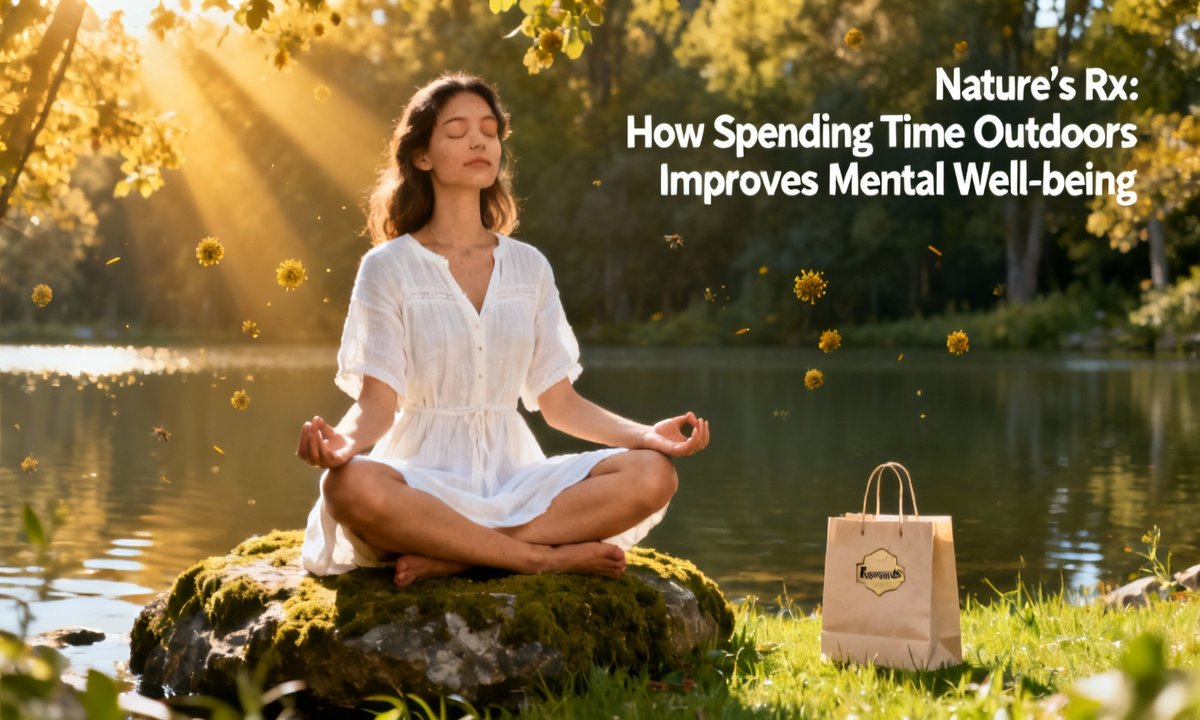Meta Title: Nature’s Rx: How Spending Time Outdoors Improves Mental Well-being
Meta Description: Discover how spending time in nature and engaging in outdoor activities can reduce stress, anxiety, and depression, while improving mood, focus, and overall mental well-being. Learn practical strategies to incorporate more nature into your daily life.
In today’s fast-paced world, many individuals across the United States are discovering the profound benefits of connecting with nature for their mental health. Daily pressures, constant technology use, and societal demands can often lead to feelings of overwhelm and anxiety. Fortunately, finding relief can be as simple as stepping outside and immersing yourself in the natural world, a strategy increasingly recognized for its powerful positive effects.
The Natural Connection: Nature’s Rx for Well-being
Extensive research over many decades consistently demonstrates nature’s positive impact on both our minds and bodies. Even short periods spent in green spaces can significantly improve psychological and physiological well-being, from reducing stress hormones to elevating moods.
Understanding the Mental Health Landscape
Contemporary surveys across the United States indicate a noticeable increase in anxiety and depression. This trend has led many to seek more holistic and sustainable solutions for mental wellness. Nature stands out as a powerful yet often overlooked resource for promoting mental health, as noted in recent studies.
The Science of Serenity: How Nature Heals
For years, scientists have explored how green spaces profoundly affect our minds. Natural surroundings seem to activate restorative brain responses, quickly calming tension. This ‘nature therapy’ can effectively diminish symptoms of stress, anxiety, and depression, offering a soothing respite.
Studies conducted in the U.S. highlight measurable mental health improvements for individuals who regularly engage with the outdoors. Nature-based interventions often demonstrate significant positive impacts on depression and anxiety levels, surpassing typical approaches found on sites like Nature.com.
These benefits arise from various physiological changes, including lower cortisol levels, reduced heart rate, and decreased blood pressure. Additionally, spending time in nature boosts positive emotions and enhances mental clarity, promoting an overall sense of calm and focus.
Quantifiable Benefits for Mind and Body
Individuals who feel a stronger connection to nature often report greater happiness and a heightened sense of purpose in their lives. The natural world, with its diverse sights, sounds, and smells, also fosters mindfulness, even without formal meditation.
Key Advantages of Outdoor Time
Spending time outdoors is linked to numerous advantages, such as reduced levels of depression and anxiety, and decreased stress hormones. It also contributes to an uplifted mood, greater life satisfaction, and improved cognitive function. These effects are often strongest in urban residents and those with higher stress levels, according to the American Psychological Association.
Embracing the Outdoors: Activities for Mental Boost
You do not need grand adventures to harness nature’s healing power. Simple outdoor activities like walking, hiking, gardening, cycling, or gentle yoga can provide significant mental health benefits. Even a short 20-minute visit to a local park or backyard can naturally lift your spirits.
The Power of Sunlight and Movement
Exposure to daylight is crucial, as it aids in Vitamin D production and helps regulate sleep patterns, both vital for a positive mood. Engaging in physical activity outdoors further boosts well-being by releasing endorphins and serotonin, acting as natural mood enhancers.
Participating in outdoor activities, whether alone or with others, strengthens social connections within natural settings. Group hikes, outdoor yoga, or community gardening initiatives can foster a sense of belonging, combating loneliness and improving overall mood.
Practical Ideas for Outdoor Engagement
Consider exploring nearby trails, joining a local gardening project, or planning a picnic with friends and family. For additional ways to combine movement with nature, discover how outdoor fitness benefits can elevate your well-being.
Targeting Stress, Depression, and Anxiety with Nature
Even brief moments in nature, as short as 5 to 20 minutes, can significantly reduce stress and anxiety during hectic days. If time is scarce, a mindful walk in a local park or enjoying lunch outdoors can help reset your nervous system and enhance focus.
Therapeutic gardening and eco-therapy programs offer structured activities designed to cultivate relaxation and mindfulness. Simply tending to indoor plants at home can also contribute to stress reduction, enhancing your living space’s atmosphere with strategies from indoor plants for air quality.
Integrating Nature into Your Daily Routine
Incorporating outdoor time into your regular schedule can lead to substantial positive changes. Consider walking or biking instead of driving, taking phone calls during a stroll in a green space, or dining outside when weather permits. These small adjustments can have a big impact.
To delve deeper into effective methods for managing stress, explore various stress reduction techniques and step-by-step guides for mindfulness and wellness practices.
Overcoming Obstacles: Making Nature Accessible for All
Access to sprawling parks or nature reserves isn’t universal, especially in urban areas where green spaces can be limited due to various factors. However, numerous creative solutions exist to help everyone connect with nature, regardless of their location.
Creative Solutions for Nature Access
Explore local small parks, discover rooftop gardens, or visit community plazas to find pockets of green. You can also introduce nature into your home with window boxes or potted plants, discovering easy indoor plants for beginners.
For those in urban environments seeking more nature at home, consider ways to design a serene backyard oasis in urban settings. Joining local initiatives to ‘rewild’ or enhance neighborhood green spaces is another great option.
Prioritizing Safety in Outdoor Spaces
When venturing outdoors, taking precautions ensures a positive experience. Consider walking with a companion in less-frequented areas, always wear appropriate sun protection and weather-suitable attire, and stay informed about local air quality or wildlife advisories.
Many nature-based activities are affordable or even free. Public parks often provide complimentary programs or guided walks designed to accommodate diverse abilities. Investigating city and county resources can help uncover more accessible outdoor opportunities.
Integrating Nature into Your Lifestyle
Adopting new habits to connect with nature doesn’t demand a complete schedule overhaul. Begin with small, purposeful steps to gradually incorporate more outdoor time into your life, making it a natural part of your routine.
Building Sustainable Outdoor Habits
Try scheduling short outdoor breaks during your workday, even for just five minutes, to refresh your mind. Plan weekly outings such as hikes, picnics, or outdoor classes with loved ones, and utilize apps to discover nearby parks, trails, or botanical gardens.
The Benefits of Socializing in Nature
Consider organizing group nature walks or volunteering for local gardening events. Participating in community outdoor activities can boost motivation and foster enduring social connections, integrating nature seamlessly into your weekly rhythm.
You can also invite colleagues or neighbors to establish regular ‘micro-routines,’ such as a Friday walk, to embed nature into your week. For those who enjoy gardening at home, cultivate a vibrant pollinator garden for well-being, which supports both personal health and local biodiversity.
For more simple strategies to embrace green living, discover various ways to incorporate nature into your day and enhance your daily life.
Bringing Greenery Indoors
On days with unfavorable weather or for individuals with mobility limitations, indoor plants offer wonderful companionship. Many easy-to-care-for options, like snake plants or pothos, can effortlessly transform your living space, elevate your mood, and promote overall wellness, enhancing your home’s atmosphere.
Conclusion: Your Path to Natural Well-being
Spending time outdoors is far more than just recreation; it is a fundamental element for fostering happiness, enhancing focus, and building resilience. Scientific evidence strongly indicates that exposure to nature improves mood, reduces stress, and increases overall life satisfaction.
By thoughtfully integrating green spaces and engaging in mindful outdoor activities into your daily life, you can unlock sustained mental well-being for yourself and those around you. Embrace nature’s powerful ‘prescription’ as an essential component of your self-care regimen.
Feel encouraged to explore various activities, maintain simplicity in your approach, and savor every moment of your journey. Both your mind and body will undoubtedly benefit from this profound connection with the natural world.
Frequently Asked Questions About Nature and Mental Health
Q: How much time outdoors is recommended for mental health benefits?
A: Studies suggest that spending just two hours per week in green spaces, or even 10–20 minutes daily, can lead to notable improvements in mood, reduced stress, and overall mental well-being, as reported by sources like the National Library of Medicine. Consistent engagement is key.
Q: What are some quick ways to connect with nature on a busy schedule?
A: Simple actions like stepping outside for a short walk, enjoying your lunch in a park, or caring for balcony plants can make a difference. Even brief, mindful interactions with nature can have a lasting positive impact. For creative tips, check our article on ways to incorporate nature into your day.
Q: Do urban parks and wilderness areas offer different mental health benefits?
A: Both urban parks and more remote wilderness areas provide significant benefits for mental health. Urban green spaces are often more convenient for daily access, while wilderness experiences may offer a deeper sense of restoration for some individuals. The most important aspect is to find regular, enjoyable nature experiences accessible to you.
Quick Steps to Start Your Nature Journey
To begin enhancing your well-being through nature, consider these practical tips: start with short daily walks in your closest green space, plan weekly outdoor excursions with loved ones, or explore local community gardening and volunteer programs.
Additionally, introduce greenery into your home with easy-to-maintain indoor plants. For more insights on enriching your environment holistically, explore guides on eco-chic home decor and smart sustainable living.
Ready to step outside? Your mental wellness journey starts with a single breath of fresh air.



